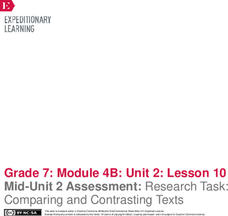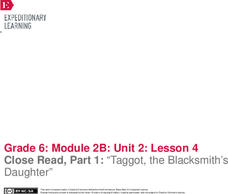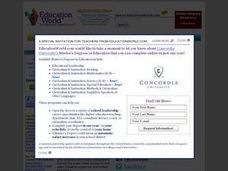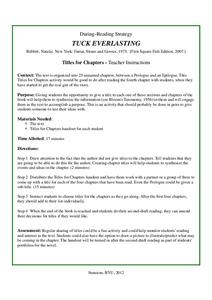EngageNY
Organizing an Opinion, Reasons, and Evidence: Text 2 for Each Expert Group
The proof is in the reading. Using the informative resource, scholars read a second article about either Althea Gibson or Roberto Clemente. As they read, they continue adding reasons and evidence to their graphic organizers to show how...
EngageNY
Analyzing Text Structure: “Generation Z Stereotyped”
Breaking the stereotype. Readers use the Generation Z Stereotyped Structure anchor chart and find the central idea of the text. They then read Generation Z with partners and discuss the text using guiding questions. Finally,...
EngageNY
Synthesizing from Informational Texts: Main Idea and Key Details from Promises to Keep (Pages 8– 10)
Learners determine the main idea of a timeline on pages eight and nine of the text Promises to Keep. They use the timeline to complete a Main Idea and Details note catcher and then share their thoughts with the class. To finish,...
McGraw Hill
Study Guide for Island of the Blue Dolphins
Dive your class into a reading of Island of the Blue Dolphins with this in-depth study guide. Breaking the novel into three parts, the resource begins each section with a focus activity that identifies a specific theme or question...
EngageNY
Mid-Unit 1 Assessment: Inferring with Pictures and Text
Mark the mid-point in the module with the authentic assessment described and provided here—the assessment and the unit focus on inferring using pictures and text. Pupils are given an image, a graphic organizer, and an article and must...
EngageNY
Mid-Unit 2 Assessment: Research Task: Comparing and Contrasting Texts
It's the half-way mark! Pupils demonstrate understanding of unit standards by completing a mid-unit assessment. After reading an informational article about water management strategies, scholars complete a graphic organizer to identify...
EngageNY
Practicing Structures for Reading: Gathering and Using Evidence to Analyze Salva’s and Nya’s Points of View (Chapter 4)
Class members discuss the gist of chapter four of A Long Walk to Water by Linda Sue Park with a partner and share their responses with the class. Next, they complete graphic organizers to answer text-dependent questions based on a close...
EngageNY
Close Read, Part 1: “Taggot, the Blacksmith’s Daughter”
There would be no luck if it were not for bad luck. Scholars take a close look at the theme of adversity through multiple reads of Taggot, the Blacksmith’s Daughter. They place sticky notes on important details of the story and complete...
Curated OER
Introduce: Comprehension Monitoring using About Trees
As scholars begin reading more difficult text, they need to acquire an arsenal of comprehension strategies. Here are few helpful ones to guide new readers through the informational text About Trees, which is linked here for...
Curated OER
Marking Time
Two narrative excerpts tell the same story from different points of view. In the first excerpt (first person), sequencing words and phrases are bolded and learners write down what the bold type does. The second excerpt is in third...
Curated OER
Working on the Slant
Compare and contrast a major news story from various newspapers. How does the perspective change? Are certain things included in some of the stories and left out of others? Have pupils complete a graphic organizer to compare how...
Curated OER
Get in the Newspaper Habit
Dive into journalism with your high schoolers! The resources provided here will help your learners write unbiased, clear, and succinct newspaper articles. First they spend time sifting through stacks of articles, filling out a graphic...
Curated OER
Predicting Events in Realistic Fiction
How do you make a prediction? Practice active reading comprehension strategies, like making predictions, with your readers. Learners make predictions during the independent reading of Dogs Don't Tell Jokes by Louis Sacher. They observe...
Curated OER
"Remembering My Childhood on the Continent of Africa" by David Sedaris
David Sedaris is quite the story-teller. Read "Remembering My Childhood on the Continent of Africa" and follow it up with this two-page worksheet. Readers will revisit the text to answer higher level thinking questions. Designed...
Polk Bros Foundation
I Can Infer the Main Idea When I Read
While reading any text, ask your pupils to keep this graphic organizer on hand. They can note down the main idea and three supporting details during or after reading. The instructions allow for individuals to use words or images to...
Do2Learn
Story Organizer
Kids can get all their plot points in line by filling out this graphic organizer with information from a story they have read. Pupils note down the title and author, the characters, the setting, and four events from the story.
California Education Partners
We Are The Ship
An assessment sheds light on scholars' ability to read, gather evidence, and draft an original written composition. Learners read an informative text twice before taking notes and discussing their thoughts and textual evidence with a...
Florida Center for Reading Research
Comprehension: Monitoring for Understanding, Simple Summary
Can your class sum up a text in a few sentences? Help them build this skill by starting nice and slow. For this summarizing activity, the teacher marks the main ideas with sticky notes. Learners read and reread the text, pausing at the...
California Education Partners
Eleven
It is difficult to articulate how growing up feels as accurately and beautifully as Sandra Cisneros does in her short story "Eleven." After seventh graders read the story and note the author's use of figurative language, they respond to...
Curated OER
Visual Literacy: Using Images to Increase Comprehension
A colorful PowerPoint is a great way to introduce the topic of visual literacy. The eye-catching presentation begins with an overview of visual literacy and then provides some specific strategies to help enhance reading comprehension. As...
US Department of State
Reader's Theater: The Adventures of Tom Sawyer
The opening chapters of Mark Twain's masterpiece, The Adventures of Tom Sawyer, can be daunting for some readers. A reader's theater assignment divides the second chapter of the novel into a seven-role script, allowing...
National Institute of Open Schooling
Aldehydes, Ketones and Carboxylic Acids
Although their name makes them sound dangerous or toxic, carboxylic acids are found throughout nature in things such as citric acid, vinegar, and even in your DNA. Through detailed readings, discussions, and answering questions...
Novelinks
Tuck Everlasting: Titles for Chapters
High schoolers synthesize the information they've learned from each chapter of Natalie Babbitt's Tuck Everlasting with a creative summarizing activity. With a graphic organizer for all of the book's chapters, readers title...
California Education Partners
Grapes of Wrath
To demonstrate their ability to comprehend complex text, individuals analyze the details, syntax, and diction John Steinbeck uses in a passage from The Grapes of Wrath to reveal the develop and evolution of Mae's character.























